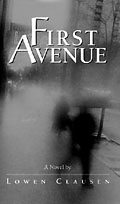WTO protests and the occasional samurai sword-wielding homeless person aside, the life of a Seattle beat cop is rarely one of excitement or danger. That’s according to the report filed by policeman-turned-author Lowen Clausen, whose new novel, First Avenue, draws from his work as an officer on the Seattle force for 13 years. In fact, the first time we encounter the protagonist, Officer Sam Wright, he’s in silent tranquility as he paddles his kayak on his early morning commute from his beachfront home to work in downtown Seattle. Wright is in many ways the typical cop on the corner, following a daily routine of checking in with shopkeepers, hustling the occasional drunk out of a doorway at dawn, and always trying to connect one-on-one with the people on the street and in the stores, forging increasingly precious links in a society that grows ever more impersonal.
First Avenue by Lowen Clausen (Watershed Books, $21.95)
But this routine is interrupted by an event that’s both mundane and atrocious—the discovery of the corpse of an abandoned infant in a First Avenue hotel. Wright’s horror at the death and his hunch that the child was not left by the mother intentionally send him on a personal search to discover the source of this tragedy. With his colleague Katherine Murphy (an occasional partner at best; she’s on the night shift, he’s on the day), he begins to uncover a conspiracy that, as bad as the reputation of Seattle’s Skid Road might be, reveals something much more sinister lurking beneath its surface.
Wright and Murphy are both admirably real people outside of their jobs, and much of the pleasure of Clausen’s book comes from seeing that despite the blue uniform, the lives of beat cops are much the same as anyone else’s, even if the daily routine might include talking a surly drunk out of threatening a bartender with a knife. Wright’s hobbies include not only kayaking but poetry, and Murphy’s visit to her parent’s farm reveals that outside her job, she still remains deeply connected to her family and rural life.
A minor problem with Clausen’s book is that while reference is made on the dust jacket to First Avenue’s transformation in the last 15 years from a cheerfully gritty collection of pawn shops, peep shows, and cheap hotels to an increasingly yuppified collection of condos, tourist shops, and retail outlets, little of this sociological analysis is evident in the book. Instead the book’s atmosphere is oddly timeless. His police detectives still file their reports on typewriters with nary a computer in sight, and there’s scant remark about how old-style shops and downtown decay are being banished by redevelopment.
A far greater problem occurs when Clausen’s book moves from the distinct and detailed life of a policeman’s beat in contemporary Seattle to the trademark police thriller climax, with a flotilla of Coast Guard boats making a perilous midnight raid on a drug-smuggling operation. Suddenly the idiosyncratic characters we’ve grown interested in disappear into a run-of-the-mill plot that seems tailor-made for a future screenplay. Given Clausen’s life experience, it’s disappointing that he doesn’t have more trust in our interest in the day-to-day experience of a policeman’s beat.
Clausen does have a strong narrative style, and his poetry-writing lawman has enough going on in his life that he needs little buoying from the clich鳠of genre. The writer also leaves himself plenty of room for a sequel, and the characters have enough appeal that even with the disappointment that occurs when the plot becomes predictable, you still look forward to the future adventures of Wright and Murphy.








